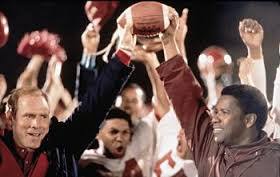Some of the best parts about participating in team sports, if you’re a team sports type of person, is that it requires a joint effort and it requires the laying down of egos in order to create a united front towards a common goal. One of my favorite movies of all time is “Remember the Titans.” I grew up in age when this movie was the go to movie for every football coach, everywhere. I remember every long road trip we took as a team ultimately began with us watching “Remember the Titans” on the bus. It was the select movie for motivational purposes in my high school years.
One of my favorite scenes of the movie came during the state championship game when, for the betterment of the team as a whole, the starting corner gave up his position for the better cornerback standing on the sidelines. Alan the current starter, walked up to Coach Yotes and admittedly gave his position away to Petey knowing that Petey was a better fit for the defense and for the teams ultimate goal of winning. I love the scene because it expresses two massive Biblical themes that I think we could all learn from.
First, the entire scene was built around Alan recognizing and accepting that he was not capable of performing the task presented to him. Alan, in recognition that he was constantly falling short of his responsibilities, had to drop his ego and drop his pride and recognize that he was not capable of performing all that had been asked of him. Isaiah 64:6 states that even in our best attempts and at our most righteous position before the Lord, we fall short. Literally our best attempts appear before God as a polluted garment. The exegetical breakdown of “polluted garment” I’m going to leave to your imagination. Furthermore, it tells us that no matter what our best attempt, we will always fall short of being good enough for eternal life. We, as depraved humanity, are just as incapable as Alan at performing the job required of us for salvation. We are weak. The faster we wrap our heads around that idea the faster we can approach the situation about depravity with the same awareness that Alan approached his inability as the cornerback.
The second truth I see in this scene come from Alan’s reaction. Alan doesn’t recognize his inability and continue to try to be better nor does he continue to believe that he might eventually achieve the requirement set before him. Alan looks, selflessly, to the betterment of the team as a whole and has the strength to admit that somebody else was stronger than he is. He had the courage and the strength to walk up to Petey and hand his starting position over right smack in the middle of the state championship football game. Now, I have to admit I struggle with the concept here that maybe Alan just gave up. However I think if we look hard at the situation Alan recognizes that he was not able, in the amount of time allotted, to adjust and prepare himself enough to get the job done and help the team win the state championship game. He recognized his weakness and in recognition of his weakness made one of the strongest moves a man can make, he asked for help. Our culture and our society defines strength in such a way that it does not allow for man to admit weakness. The Bible defines strength much differently. 2 corinthians 12 lays out this truth in full detail as Paul admits he has a thorn, a weakness. His response to that weakness is asking for the Lord to take it away. The Lord, in his sovereignty, says no. In fact he not only denies Paul’s pleas, he tells Paul that the very weakness that he is begging to be removed from him will be his source for strength. Literally that weakness is the catalyst for God’s power being made perfect in Paul. Just like Alan, Paul first had to admit he was weak and incapable.
This reality remains true for our lives today. Sometimes the strongest thing we can do is admit to a friend or a community or the Lord that we are incapable of something and ask for help. True strength isn’t always our ability to complete every task at hand but sometimes true strength is defined by our ability to recognize our weakness and ask for help. In a similar manner, my wife will, every now and then, admit her own weakness and ask for my help on a certain task. I respond to that plea by completing that task with all that is in me (because I don’t want to seem inferior). When we admit that we are incapable of saving ourselves or being good enough to gain God’s stamp of approval, we recognize that it is His strength that saves us not our own. The Bible is clear in Ephesians 2 that even in our best attempts we fall short of the standard to God. That standard is perfection. The first step to salvation is recognizing our weakness and admitting our inability. Just as the step to the Titans winning the state championship was Alan admitting his inability, It takes an incredible amount of strength to admit weakness and admit and incapability personally. This is especially true of athletes.
True strength is often defined by our ability to do just that, admit weakness. The more capable and gifted you are as a human the more true this is. It’s hard to admit when you’re incapable. However, often this admittance is the first step to a major work of God in your life. Athletes, don’t be afraid to recognize your inability. Sometimes that recognition can be the catalyst for a strength and a result that was otherwise impossible.
FRXD








